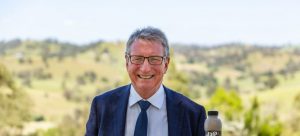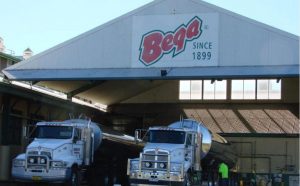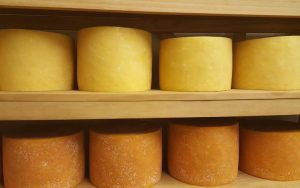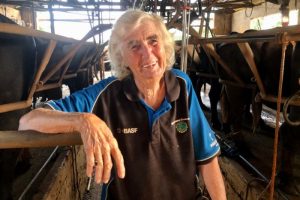
Woombye Cheese owner Beth O’Leary said that demand was strong for her Blackall Gold Washed Rind, which was judged the nation’s best cheese at the 2023 Australian Grand Dairy Awards.
“You probably pay a little bit more but it’s an artisan handmade cheese, the only machine we have in that factory is a dishwasher, everything else is done by hand,” Ms O’Leary said.
The decadent European-style handcrafted soft cheese takes 12 days to mature.
“Eating quality cheese is about the experience,” Ms O’Leary said.
“I think people like to treat themselves to something and that’s actually a cheap night in, to sit on your deck with your neighbours, have a nice bottle of wine, have some cheese,” Ms O’Leary said.
A cheese fanatic who visited 30 artisan makers around Australia before buying Woombye Cheese last year, Ms O’Leary recommended “keeping it simple”.
“Some fresh bread, a few fresh tomatoes, drizzle some honey over the top. It’s just absolutely amazing, you really can taste and understand the slow process that comes with making cheese.”
Cheese trends
Rabobank senior dairy analyst Michael Harvey said some people had swapped to buying cheaper unbranded table cheese in response to cost-of-living pressures.
“But one of the other things that happen in this environment is consumers still want some indulgence,” Mr Harvey said.
“They still want to entertain, so they’re entertaining at home, and having a little bit of indulgence at home can help sales of things like speciality cheese and ice-cream.”
History of cheese
The oldest archaeological evidence of cheese was found in an Egyptian tomb, dating back to 3200 BC.
No-one knows who first made cheese, but one legend links it to an Arabian merchant who stored his milk in a pouch made from a sheep’s stomach, as he journeyed across the desert.
The International Dairy Foods Association speculated that the rennet in the pouch’s lining, combined with the sun’s heat, caused the milk to separate into tasty cheese curd and thirst-satisfying whey.
Modern role
Sam Penny’s online business, Cheese Therapy, kept many small-scale cheese makers afloat during bushfires and the pandemic by selling “rescue boxes” of their cheese.
Now the extreme sportsman, who attempted to swim the English Channel in winter, has taken the plunge and launched his own range of handmade cheeses, Max + Tom.
“One of the really disturbing things about the dairy industry is that in 1980 we had 22,000 dairy farms; today we’ve got less than 6,000,” Mr Penny, who gave a Ted Talk on the value of regional cheesemaking, said.
“Big multinationals are moving into Australia and taking over a lot of our farming. It’s really disturbing, so when you buy direct from an artisan producer, we’re able to make small-scale farms more viable.”
Swiss-inspired
For 19 years, Sara Bucher and her Swiss-born master cheesemaker husband Markus, have produced 16 different kinds of cheese at their agritourism destination, Maleny Cheese.
Nine years ago, they bought an Obi Obi dairy farm and linked with five other local dairy farms to secure a milk pool for artisan cheesemakers in south-east Queensland.
“We’re so humbled and grateful to the community that continues to visit Maleny Cheese; that people buy our products when a Victorian or an international product is there on the shelf competing,” Ms Bucher said.
“Those simple steps keep our business sustained, and our business sustains so many other local farms and families.”
Like Maleny Cheese, Kenilworth Dairies pays a higher, sustainable price to local farmers for their milk.
“In the Kenilworth area, I think there’s only seven dairy farms left. There used to be 99 dairy farms and that was in the year 2000,” Kenilworth Dairies manager Donna Dodson said.
The family-owned agritourism business makes 132 products including gourmet cheese, bottled milk, mousse, milk and yoghurt products.
Ms Dodson said COVID has “seen business skyrocket” and the biggest challenge was securing enough workers.
“We’ve now got 54 staff. We probably need another six that we can’t get, so our business is increasing tenfold, but our labour isn’t keeping up with that,” Ms Dodson said.
























